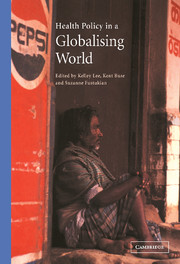Book contents
- Frontmatter
- Contents
- List of figures
- List of tables
- List of boxes
- Notes on contributors
- Foreword
- Preface
- Acknowledgements
- Abbreviations
- Part I
- Part II
- 9 Global rhetoric and individual realities: linking violence against women and reproductive health
- 10 The globalisation of DOTS: tuberculosis as a global emergency
- 11 Ageing and health policy: global perspectives
- 12 Workers' health and safety in a globalising world
- 13 Globalisation, conflict and the humanitarian response
- Part III
- References
- Index
- References
13 - Globalisation, conflict and the humanitarian response
Published online by Cambridge University Press: 22 September 2009
- Frontmatter
- Contents
- List of figures
- List of tables
- List of boxes
- Notes on contributors
- Foreword
- Preface
- Acknowledgements
- Abbreviations
- Part I
- Part II
- 9 Global rhetoric and individual realities: linking violence against women and reproductive health
- 10 The globalisation of DOTS: tuberculosis as a global emergency
- 11 Ageing and health policy: global perspectives
- 12 Workers' health and safety in a globalising world
- 13 Globalisation, conflict and the humanitarian response
- Part III
- References
- Index
- References
Summary
In the twentieth century, the idea of human universality rests less on hope than on fear, less on optimism about the human capacity for good than on dread of human capacity for evil, less on a vision of man as maker of his history than of man the wolf towards his own kind.
Michael Ignatieff (1998)Introduction
Collective violence confronts daily tens of millions of people living in zones of conflict, as well as those displaced within their own countries or across national borders. For those previously living in conditions of peace and security, collective violence and its effects were somewhat removed: the terrorist attacks in America on 11 September 2001 shattered that perception. Yet, with such violence regularly splashed across our television screens and newspapers, we are acutely aware of the need for appropriate collective security and humanitarian responses. Nobel peace prizes for the Office of the United Nations High Commissioner for Refugees (1981), International Physicians for the Prevention of Nuclear War (1985), International Campaign to Ban Landmines (1997) and Médecins sans Frontières (1999) have given recognition to the vital role played by humanitarian agencies and the United Nations itself (Nobel Peace Prize 2001) in the challenge of preventing or mitigating these crises. However, despite increasing knowledge of the detrimental effects of violent political conflict, our ability to prevent such conflicts, and to take appropriate action while they are ongoing or in their aftermath, remains poorly developed.
- Type
- Chapter
- Information
- Health Policy in a Globalising World , pp. 229 - 248Publisher: Cambridge University PressPrint publication year: 2002
References
- 1
- Cited by

